
The de Lusignan Dream - Cyprus 1337
- Thread starter ComradeOm
- Start date
-
We have updated our Community Code of Conduct. Please read through the new rules for the forum that are an integral part of Paradox Interactive’s User Agreement.
You are using an out of date browser. It may not display this or other websites correctly.
You should upgrade or use an alternative browser.
You should upgrade or use an alternative browser.
I would agree that it appears that the time is nigh for Cyprus to spring to the fore in gaining control of the Levant.
I'll give even odds that Cyprus gets to the Jerusalem before the Horde.
I'll give even odds that Cyprus gets to the Jerusalem before the Horde.
Syrian Nights (1350-1356)
In August 1350 Abdul-Wahab, Emir of Tripoli, became the first to seize the opportunity and openly rebel against the child Sultan Shihab Bahri. This precipitated one of the more bizarre episodes in Outremer history with the Sultan of Egypt conspiring with Latin rulers to attack Muslims while his own realm was under invasion from crusading hosts. Agreement was reached with Jaune d'Arago, King of Mallorca, and later Guy de Lusignan of Cyprus to depose of Abdul-Wahab and allow for the installation of a Mamluk emir. Rumours at the time also suggested that the lordship of Antioch had been offered to Jaune d'Arago… a tempting prize for any in Christendom.
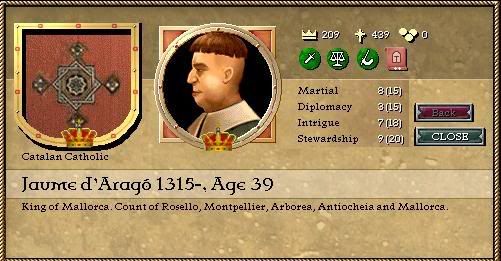
Jaune d'Arago, King of Mallorca
However foolhardy the move appeared in hindsight, and indeed to many at the time, there were nonetheless good reasons for this gambit. At the most basic level there was little else that Shihab Bahri could do to influence events. So tenuous was his grasp over his vassals that the Sultan could not compel the emirs of Amman, Syria, Jerusalem or El-Arish to rally to his aid (indeed the latter would also declare independence within the year) while the continuing war against the crusaders in Egypt itself made direct intervention impossible. The only independent Muslim power in the region consisted of the Sultanate of Eretnid which was fully preoccupied with defending its realm from the Mongols.
The campaign preparations were hurried and in January 1351 Jaune d'Arago of Mallorca arrived in the Levant and immediately began investing the city of Antioch. The lack of co-ordination with Cyprus, where Guy de Lusignan was only setting out, indicates a high degree of competition between the two kings. This would set the later tone for the campaign.
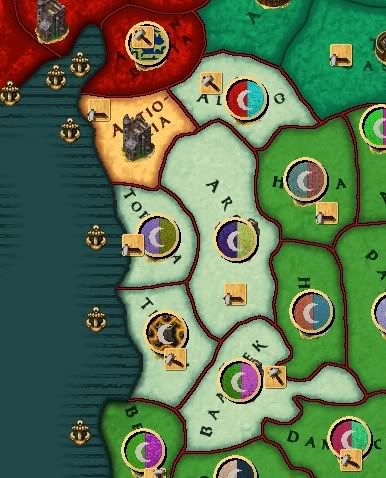
Emirate of Tripoli in 1351 (Antioch has fallen to Mallorca)
While apparently caught flatfooted by d'Arago's rapid transit and victory in Antioch, Guy still held a number of advantages, not least of which being numbers. The first soldiers, making the short voyage from Cyprus, arrived in Tripoli in June 1351 and rapidly secured the town before, now accompanied by the King, proceeding to Archa, which was invested on 23 July. The superior numbers commanded by Guy allowed for rapid resolutions to each siege - Archa fell on 25 September, two days after Tortosa fell to d'Arago. While the King of Mallorca turned north towards Aleppo, the Cypriots besieged Baalbeek to the south.
More importantly than mere numbers however was the logistical base provided by Cyprus. Supply fleets operating from the island, and mainland territories, had been highly instrumental in keeping the crusader armies in the field, more so considering the hasty preparations in Mallorca. By controlling these supply routes Guy wielded considerable influence over his fellow king. A perfect example of this power was the return of the Hospitaller order to the Holy Land. Eager to put past unpleasantness behind, but equally unwilling to cede land, it was apparently Guy's idea that the Order establish itself in Tortosa… newly conquered by Mallorca. If there were any doubts as to the relative positions of the two kings then they can only have been dispelled by the siege of Aleppo where, on 5 January 1352, it was the newly arrived Cypriot banner that was raised over the broken walls.
It is no wonder that Jaune d'Arago departed the Levant so soon after the fall of Aleppo. He left with the title of Count of Antioch and little else. According to rumour and hearsay, so disillusioned was Jaune that he refused to return east to prevent the Arab (El-Arish) reconquest of Antioch in late 1356.
For Cyprus however the war was extremely profitable. Guy de Lusignan was named Duke of Tripoli and undertook the personal management of the new lands. The budget deficit was rapidly reversed with the conquests leading to tremendous treasury growth (70 gold per month, total). Perhaps more importantly was the prime position that Guy now found himself in. The disintegration of Egypt, aided by the Cypriot assassination of Chancellor Jamila in1354, gave hope that the reconquest of Jerusalem could not be far away. To this end a mass recruitment scheme was launched throughout the lands of Triploi with the construction of training grounds in several provinces. Not even the appearance of Mongols on the border with Aleppo in October 1355 could deflect interest from the Holy Land.
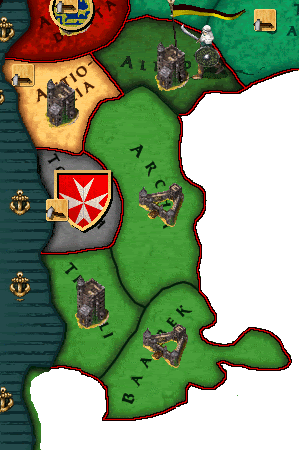
Frankish possessions in Levant in 1352
An opportunity very well exploited! Now you are set to march on Jerusalem as soon as the new provinces recover enough to be able to field sufficient troops.
Nicely played!
I'm a tad concerned however at the line about the reconquest of Antioch as well as the arrival of the Horde in Aleppo. I dearly hope that the de Lusignan's hold the back door before marching south into the Holy Land or their stay may not last even a generation!
I'm a tad concerned however at the line about the reconquest of Antioch as well as the arrival of the Horde in Aleppo. I dearly hope that the de Lusignan's hold the back door before marching south into the Holy Land or their stay may not last even a generation!
I've fallen a bit behind on my updates schedule due to an avalanche of work (and a bit of hectic gameplay). Hopefully I'll get a few hours before or during the weekend to hammer out the next few updates.
Jerusalem and Mesopotamia (1356-1358)
The Tripoli campaign of 1351 served to both bolster Cyprus's standing in the region while simultaneously highlighting the impotency of the Mamluks. Even after relocating his court to Amman, after being ejected by the crusaders from Egypt, Sultan Shihab Bahri cut an increasingly isolated and marginal figure in Outremer politics. Indeed one of his last major contributions to history was the inability to prevent or reverse the independence declared by Emir Bilal of Jerusalem on 10 March 1356. This was an event at least that would reverberate around Christendom.
The Egyptian crusade and Cypriot reconquest of Tripoli had been closely followed in Europe. Contemporary sources record that after decades of defeat and disappointment there was a growing belief that the recovery of the Holy Land could not be far off. Crusade enthusiasm amongst the populace had never particularly waned in Europe but in 1356 it appears to have reached levels unprecedented since 1095 or 1188. In what were possibly the first package tours, nobles from around the region would flock to Egypt where they could spend a number of weeks engaged in light warfare with the "Saracens". Such activities were rarer in the more tightly controlled Cypriot lands but are well documented nonetheless.
Crusade fever may have been most prominent amongst the footloose nobility but it was hardly isolated to it. The Christian monarchs themselves cannot have but been aware of the potential for gains in the East. Guy certainly was not. The independence of Jerusalem presented a golden opportunity to re-establish the Kingdom of Heaven in one fell swoop… a notion that was hardly the preserve of Guy alone. The de Lusignan claim to the crown of Jerusalem was not universally recognised, in particular the d'Anjous of Sicily were recognised as rightful kings by the Pope, and the seizure of the city by another Christian lord would complicate matters no end. Guy was no doubt aware of the wider European scrutiny when he mobilised his Anatolian regiments on 23 March 1356 and directed them to sail for Tripoli where his son Hugues awaited with the Syrian armies. Jerusalem beckoned.
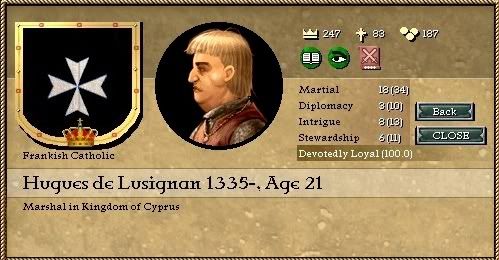
Hugues de Lusignan
Of course Outremer politics were never that straightforward and trouble to the east would prevent the Frankish armies even reaching their ships. For the first time in the past decade the Sultanate of Eretnid had secured peace on its borders. After the embarrassing peace with Cyprus, Kılıç had turned his attentions to the Mongol menace. For over eight years he had valiantly fought the Il-Khanat before finally falling on the fields of Melitene. His son Baturay had taken up the task and finally fought the Mongol horde to a standstill, timely aided by the latter's conflict with the Golden Horde and expansion north. The diversion of the horde through the Caucasus region and beyond removed, temporarily at least, the great eastern threat that had hung so menacingly over the Outremer for decades.
With a secure eastern border Baturay cast his eyes west and cannot have been comforted by the mass mobilisation of Cyprus in spring 1356. Perhaps it was the fear of Christian attack that spurred Baturay. Muslim chroniclers recorded an increasing paranoia creeping into the Sultan's demeanour. On 4 May 1356 he publicly declared his intentions to destroy the infidel armies in Anatolia and issued a call to jihad.
It did not take long for word of the Eretnid mobilisation and declaration of war to reach the Cypriot court where Guy would promptly proceed to prove the old adage that generals always plan to fight the last war. The bulk of the mobilised Frankish regiments were immediately placed under the command of Charles Mondromenos and directed to advance towards Tarsos, presumably in an attempt to force a peace settlement. The flanks of this advance would be covered by Guy's royal Dorylaion regiment which would invest the fortifications in Tyana. To the south Marshal Hugues readied the Syrian regiments to open a second front by advancing through what had once been Armenia Minor. Once more however it would be the blood soaked fields of Tarsos that would determine the victors of the war.
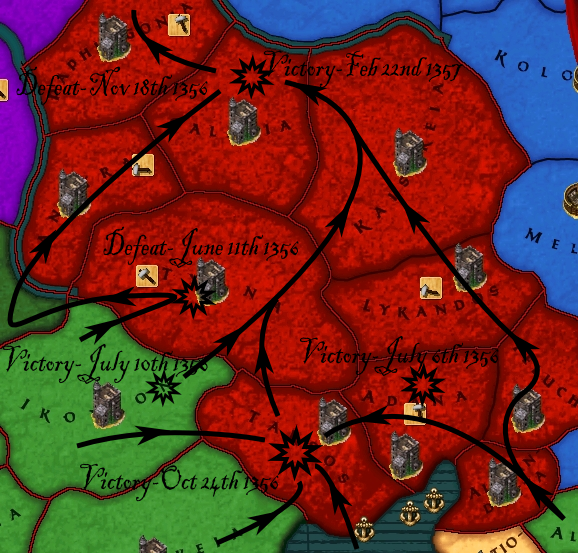
The Eretnid War
For roughly four months the fighting raged in and around Tarsos. The failure of Guy to seize Tyana, his army had withdrawn to await reinforcements following defeat on June 11, and cut off the Muslims forces to the south had dashed any hopes of a quick victory. Despite this the inconclusive fighting across the fields surrounding Tarsos rapidly became the focal point of the war with both sides funnelling resources to support the fierce fighting. The battle's outcome would eventually be decided by the Frankish advance to the east.
The Syrian regiments under Hugues de Lusignan had enjoyed some success in advancing north from Tripoli. Alexandretta had rapidly fallen and Hugues had wasted no time in moving north towards Teluch. He could not have been oblivious to the worrying rumours from Tarsos however and in early July he dispatched his chief lieutenant Orhan of Bukhara, an Arab Christian, westwards with the bulk of his forces. After pausing only to lay claim to Adana the relief force under Orhan arrived in Tarsos in late August. These timely reinforcements would prove to be the decisive factor in the eventual Frankish victory on October 24.
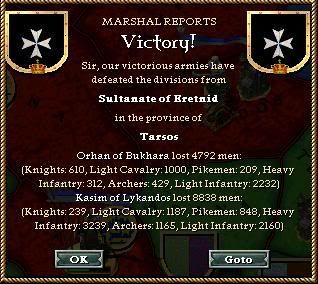
Victory in Tarsos came at a cost
The victory in Tarsos was hard won but of vital importance. Baturay would inflict more defeats on the Cypriot armies as the war progressed but none could reverse the loss he suffered in Tarsos. To the north Guy's campaign had resumed strongly, Ankyra would fall on September 28, until it was checked at Galatia on November 18 while his son Hugues had met little resistance in his march northwards. With the liberation of Tarsos the armies of Charles Mondromenos and Orhan were free to rejoin the fighting further north and the war's outcome could not be said to be in serious doubt. Despite this it still took almost a year of determined campaigning before last vestiges of Eretnid authority had been destroyed. Sinope would finally fall on 8 August 1357.
The war had not been of Guy's making. Despite this it had led to the destruction of the last Turkish power in Outremer and the complete victory of Cyprus over the Sultans of Anatolia. The campaigning had been expensive but not ruinously so and Genoa, in a pleasant seasonal surprise, donated over 1,700 bezants on Christmas Eve in exchange for trading rights along the newly opened Black Sea ports. It is unlikely that either the Papacy or Venice were pleased at this but such was Guy's reputation that no immediate action could be taken. This windfall allowed the King to divest himself of the bulk of the new lands, while retaining the more profitable provinces of course. Both Charles Mondromenos and Orhan were rewarded for their services during the war by being granted the titles of Prince of Chersianon and Armenia Minor respectively. While Guy's son Hugues was not elevated to the rank of Prince he retained his large lands captured during the war. To these nobles were left the weighty tasks of managing the new lands and guarding against the Mongol presence while Guy could return his gaze to his Syrian possessions and the Holy Land beyond.
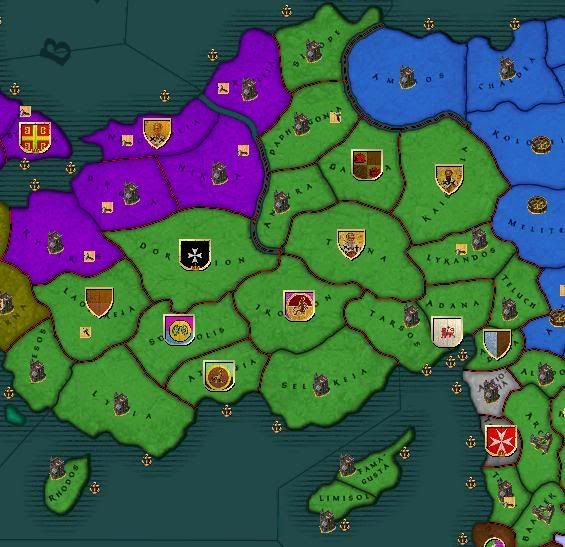
Cyprus in 1358
A shame about the Eretnid ruining your plans, but well done in finally getting rid of them. But I wonder if Guy will now have the time necessary to capture Jerusalem before things get ugly with the Mongols.
I do like that map of movements, victories, and defeats. Actually quite a complicated tale, but well presented.
Thankfully that isn't looking too likely right now. The Il-Khanat has gotten distracted with rampaging through the Caucasus and Ukraine. Seeing as I've absolutely no interest in fighting the Mongols its a real weight off my mind as things start heating up in the Levant.Shuma said:A shame about the Eretnid ruining your plans, but well done in finally getting rid of them. But I wonder if Guy will now have the time necessary to capture Jerusalem before things get ugly with the Mongols.
With regards the map, I decided to use one after sitting down and failing miserably to convey the movements of the war through words. Personally I feel it provides a better summary of events than my writing alone ever could.
On a slightly related topic, he's the map of the Levant in 1358. Just so people know where everything is for the next few updates
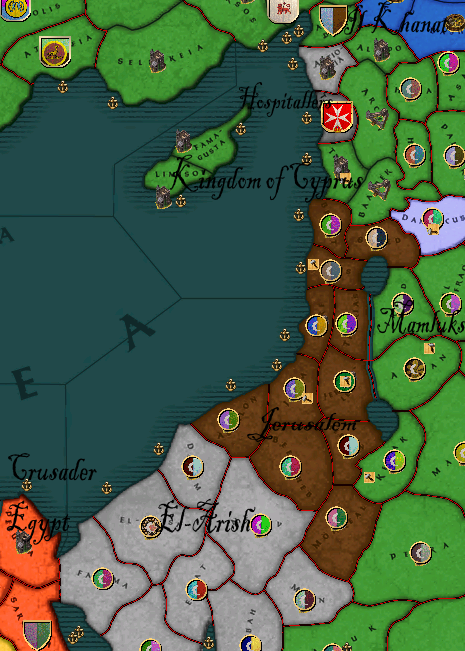
Shouldn't be too hard to heave your nadger into Jerusalem's back passage. Provided they aren't allied to anyone, of course. What's the diplomatic situation like in the Levant?
Its actually surprising quiet, albeit still very fluid, at this time. The crusader conquest of Egypt is just about complete. El-Arish has taken Antioch from Mallorca and those two are still at war. Bilal of Jerusalem is still fighting the Mamluks for independence and is holding his own. He also happens to be at war with half of Christendom but the crusaders have yet to make their way to Palestine.Vincent Julien said:Shouldn't be too hard to heave your nadger into Jerusalem's back passage. Provided they aren't allied to anyone, of course. What's the diplomatic situation like in the Levant?
Which reminds me that I really should get a move on with this…
The Polish Crusade (1358)
The war waged against Baturay of Eretnid had been both hard won and draining. Despite this the eyes of Christendom remained firmly focused on the Holy Sepulchre with the campaigning to the north of the Holy Land firmly relegated to that of a sideshow. Insofar as the campaign had registered on Europe it was in acknowledging that the land route taken by the knights of 1095 was once again open. Above all this suited the purposes of King Borzyslaw Piast of Poland who led what would come to be called the Polish Crusade.
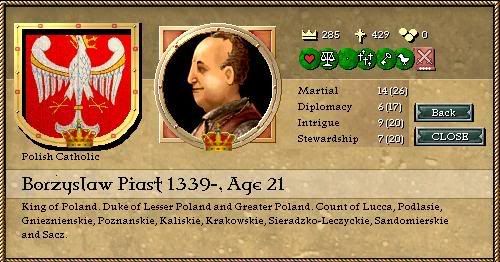
King Borzyslaw Piast of Poland
Like much of the European nobility, King Piast had been dazzled by the lure of Jerusalem following the events of the previous few years. The collapse of Sultanates in both Anatolia and Egypt had sparked a sense that the recovery of the Holy Land was not just inevitable but immanent. Unlike most royalty however Borzyslaw Piast was not satisfied with recording such divine planning; he intended to play a role in it. Preparations for crusade were begun following the harvest in 1356 when the King convened a congress of leading Polish nobles to discuss the events in the Levant. There the King and his brother, Jerzy Piast Duke of Mazovia, publicly received the cross from Archbishop Maciej Borkowic and pledged to recover the Holy Land from the "infidels, heathens and Saracens". While the armies of Cyprus battled across eastern Anatolia, the combined royal and ducal armies of the Polish royal family, perhaps some ten thousand strong, slowly made their way south.
The crusading host finally reached the Cypriot court at Dorylaion in the first weeks of February 1358. There the realities and ideals of Outremer once again clashed. Guy de Lusignan was, ironically not unlike past Byzantine Emperors, perturbed at the arrival of outside armies that could disrupt his own timetable for war. Following the campaign in Mesopotamia the armies of Cyprus were hardly in ideal shape to resume the offensive. At the same time Guy is unlikely to have been keen on the burden of hosting the Polish armies for the summer months. This disagreement would be simply one of many points of contention between the two kings.
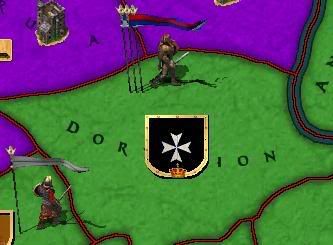
The Polish Crusaders arrive at Dorylaion
During his time at Dorylaion Borzyslaw flatly rejected refused, more than once, to acknowledge Guy's lordship of Jerusalem and its lands. Such an oath would have placed lands conquered by the Poles under nominal Cypriot lordship as feudal lords. In this regard the Polish King's refusal both undermined Guy's authority and contributed to the extremely ill feelings that would result from the meeting. Today it remains a matter of debate as to whether this clash was due to Borzyslaw's own ambitions in the Levant or his acquaintance with the other claimant of Jerusalem, Mathieu d'Anjou.
After an inconclusive week the Polish armies left Dorylaion with little to show for their stay. Guy had eventually promised to provide the vital logistical support and markets for the venture as well as guides through his lands. Crucially however Borzyslaw had failed to garner the support of the Cypriot armies on which his crusade had relied upon to supplement his slim numbers. Instead Guy had decided to launch his own, separate and distinct, campaign in the Holy Land. This division of operations that resulted from an inability to reach political settlement in February would lead to military disaster in June.
The arrival of the Polish armies had thrown Guy's own leisurely preparations into disarray. By the time Borzyslaw's host had made its way through Anatolia and into Syria Guy had only managed to muster a mere seven thousand men, primarily drawn from the Syrian regiments, and possessed just over a thousand gold bezants in his war treasury. It was a far cry from the King's usual meticulous preparations and had the advantage only in that the army was just a short march from the Jerusalem territory. Finally on 22 April 1358 Guy reached the head of his army and issued the orders to advance towards Muslim Beirut… despite the Borzyslaw's prior departure in the direction of Safed.
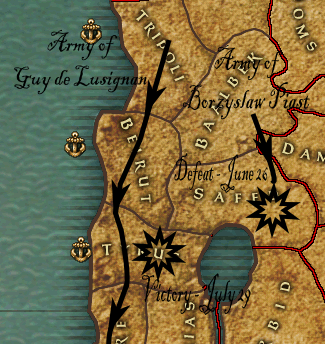
The Galilee Campaign
The Cypriot advance was relatively successful. The Muslim garrison at Beirut was scattered on May 13 and the city would fall a month later. The march south immediately resumed with the army shortly arriving outside the city of Tyre. Despite the brutal heat morale was high with no major opposition being encountered. There was an excellent reason for this. Emir Bilal of Jerusalem had spent an exhausting but generally successful two years in fighting off his former Mamluk masters in Amman. He had been campaigning east of Damascus when word of the Christian advance was first received. Gathering up his armies Bilal turned west to deal with this new threat and it was in the first week of June that the Arab armies caught the Poles besieging Safed by surprise.
As he finished up his own siege at Beirut Guy cannot not have been unaware of the pitched battle occurring so close at Safed. Yet he did nothing to assist the Poles as they found themselves caught between the tall fortress walls and the relief army of Bilal. What followed was a disaster not seen in crusading history since the annihilation of Louis IX's crusade at Mansurah a century earlier. While the Cypriot army maintained their siege at Tyre, the Poles camped outside Safed were annihilated with almost the entire Polish army was killed or captured. King Piast himself was extremely lucky to escape with his life and small retinue.
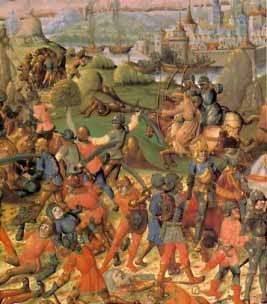
Battle at Safed
As the few survivors of the Safed disaster struggled to reach friendly territory, their fellow Christians were busy preparing for battle at Tyre. The city had fallen on July 19 and, rather than abandon his position, Guy had chosen to fortify the town as he awaited the arrival of regiments only now mobilising throughout both Cyprus and Anatolia. First however he would have to contend with the Muslim army seeking capitalise on its numerical advantage and earlier success at Safed. As both sides summoned reinforcements battle finally commenced with the Muslim host arriving at Tyre on July 27.
The battle at Tyre would drag on for two bloody and hard fought days. Eventually however the Frankish forces, aided by the timely arrival of seaborne reinforcements, would triumph. The Arab army was thrown back with heavy casualties and, taking a significant gamble, Guy abandoned his fortifications at Tyre and followed the disorganised army south towards Acre, harrying the Muslims all the way. The Polish campaign had come to an ignominious end on the fields outside Safed but Guy's crusade in the Holy Land had survived and could now begin in earnest.
Nice update, I liked the interaction between the crusading Polish King and Guy, Jerusalem looks like it may be finally back in the Lusignan's grasp.

